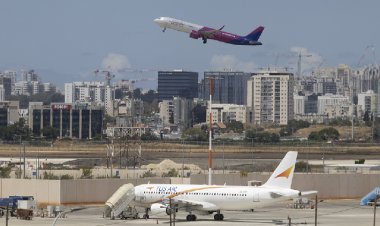The Fall of Assad Is a Chance for Donald Trump
An expert on Syria provides insights on how Washington can utilize the new regime in Damascus to counter Iran and Russia.

The new leader in Syria is Abu Mohammad al-Jolani, a radical Islamist who previously fought alongside al-Qaeda in Iraq. However, Landis notes that he has since moderated his views significantly. With more than 14 years of experience in the Middle East, Landis, who is preparing to release a book titled *Syria at Independence: Nationalism, Leadership, and Failure of Republicanism*, suggests that President-elect Donald Trump has a unique opportunity to collaborate with Jolani to counter Iran and Russia’s influence in the region. “America has wanted a Sunni-led state in Damascus in order to hurt Iran. And Russia. And it’s now got it, right? So you know — why bite the hand that you wanted it now?”
This conversation has been condensed for brevity and clarity.
What led to the abrupt downfall of Bashar al-Assad's regime?
It has been a gradual process, lasting 14 years, during which the spirit of the Syrian army fell away. Soldiers were not being paid adequately, with officers earning $30 a month and enlisted men just $10. To support their families, officers were allowing many soldiers to go home without even receiving their $10 payments. Financially, Syria was in ruins, politically bankrupt as well, unable to offer its citizens any hint of a brighter future.
The U.N. reported that 90 percent of Syrians were living below the poverty line earlier this year, while food aid was rapidly diminishing.
Syria’s wealth came largely from its oil and gas industry, which constituted approximately 40 percent of government revenue before the revolution. Though Syria lacks large oil reserves, it had enough for its own needs. However, losing control of these resources means that most homes today receive only an hour or two of electricity per day. In winter, schools and homes are freezing, resulting in dire living conditions for the populace.
Those oil wells are predominantly under U.S. control now and are quite dilapidated, yielding far less than their potential output. Reviving the oil sector through foreign investments is essential for the Syrian government, leading to a potential power struggle with the U.S. Previously, the U.S. claimed these resources were held to prevent access by ISIS, as well as Russia and Iran, now regarded as adversaries. With the current Syrian government no longer positioned as an enemy of the U.S., the legal justification for keeping control of these oil wells diminishes.
The leading rebel faction that recently seized Damascus, Hayat Tahrir al-Sham, is radical Islamist in nature, and its leader, Abu Mohammad al-Jolani, has ties to al-Qaeda, having fought against Americans in Iraq. Although he has distanced himself from these extremist organizations, can we presume he and his group won’t be adversaries of the U.S.?
That judgment remains to be seen. Jolani has expressed a desire for cooperation, claiming there is "no place for extremism in Syria." He views Iran, Hezbollah, and Assad as the only threats facing Syria. By making this assertion, he plays to the expectations of the U.S., but Washington may remain skeptical for a time, using this as leverage to keep sanctions in place and restrict support for his government to prevent its rebuilding efforts from succeeding. However, if Jolani opts not to engage the U.S. in conflict and instead focuses on governance and aiding refugees' return, the U.S. would face criticism if it does not reconcile with him. Early reports suggest Jolani has reached out to the U.S. government, indicating that engagement with him might be essential. The new government would be looking for validation from the international community, and prompt action from the U.S. will be necessary since many in the Arab world and beyond may wish to extend the benefit of the doubt to him.
Isn’t he still listed as a terrorist by the U.S., with a significant bounty on his head?
Indeed, there is a substantial bounty on his head, and numerous individuals in Washington advocate for his removal from the terrorist list. Analysts at the Washington Institute for Near East Policy have been vocal about reassessing his status, arguing he has moderated significantly and undertaken positive measures.
Can you delve deeper into how Jolani and HTS have evolved ideologically? For instance, when the Taliban regained power in Afghanistan, they also spoke of moderation and engagement, yet they still represent a radical Islamist group. Additionally, during HTS's governance in Idlib, it was known for its harsh tactics, including torture.
Indeed, Jolani hasn't established a democratic state or entertained notions of democracy in his discussions. The situation in Idlib was compounded by the influx of refugees, and Jolani has not endorsed democratic ideals, which have been a prominent demand from the U.S. highlighted by U.N. Resolution 2254, calling for Syria's democratic transition. President Biden even referenced it in a recent address. Nevertheless, Jolani exhibits more flexibility than Iranian counterparts and appears willing to court Syrian minorities and foreign support.
Are we not justified in fearing that Syria could become a breeding ground for radicalism or a resurgence of groups like al-Qaeda or ISIS? Even if we accept that Jolani is professing moderation, his true intentions remain unclear.
That uncertainty exists. Nevertheless, one might argue that the legitimacy of ISIS will diminish due to the rise of Islamist governance in Damascus, eliminating their justification for waging war against Shiites. The average Syrian youth is unlikely to view Jolani as an enemy. Therefore, Jolani may need to take decisive action against ISIS to placate Western concerns, which will serve as a significant test for him.
Could you provide a brief overview of how the U.S. ended up controlling Syria's oil and gas resources?
This occurred during ISIS's occupation of the region along the Euphrates River, where the largest oil and gas reserves are located. The U.S. targeted these resources through airstrikes and subsequently established control over them, using the revenue to support Kurdish forces in the northeast.
The U.S. has hesitated in its response to Syria since the Arab Spring began in 2011. President Obama was reluctant to supply substantial aid to Syrian rebels due to concerns about a possible Islamist takeover. Simultaneously, the U.S. maintained its opposition to Assad, resulting in a perception of a passive policy. This created a vacuum that allowed Russia to intervene in 2015. Can you elaborate on this evolution?
The CIA found itself in a precarious position because President Obama wanted to see Assad ousted but was also averse to the disintegration of the Syrian army. Consequently, he delivered a contradictory directive to the CIA: remove Assad without dismantling the army. This proved to be an unfeasible goal since the Syrian army's top commanders are predominantly Alawite, and they were unprepared to relinquish power to Sunni rebels. As extremist groups like al-Qaeda and ISIS gained greater influence among the rebels, U.S. hesitance grew, leading them to halt efforts to overthrow Assad, which opened the door for Russian intervention.
It’s plausible that U.S. officials were secretly relieved by Russia's entry since it prevented the collapse of Assad's army and facilitated a degree of stability. Obama’s first comment following the Russian intervention was that the U.S. would not engage in conflict with Russia over Syria. Subsequent discussions between Russian Foreign Minister Sergey Lavrov and Secretary of State John Kerry focused on what they termed "de-confliction," effectively dividing Syrian territory between the two powers. The U.S. retained control of areas north and east of the Euphrates, while Russia secured the remainder. Additionally, Turkey intervened to prevent a Russian and Assad-led takeover of all territory, establishing a buffer zone in Idlib and northern Aleppo province where various militias sought refuge.
Has Assad's fall been primarily a result of his overreliance on Iran and Russia?
Yes, his downfall is attributed to multiple factors, including arrogance and a failure to recognize the fragility of his position. After Israel's significant blows against Hezbollah and restraining Iran's actions, he was left vulnerable.
Could Russia’s diminished support also have been influential, particularly as it became preoccupied with issues in Ukraine?
All three elements—Israel's actions, fading Russian support, and the disappearance of economic backing for Assad—played critical roles in his downfall. The rebels seized their opportunity, particularly following Hezbollah's reduced strength, which had previously been instrumental in on-ground victories for Assad.
What does this development signify for the larger Middle East, particularly regarding Iran's weakened state?
This represents a serious setback for Iran. With Hezbollah significantly weakened, the Iranian leadership’s ability to rebuild the group faces major obstacles. The notion that Hezbollah could deter Israeli strikes on Iran's nuclear assets is effectively nullified, allowing Israel greater latitude to act. Speculation is rife about whether Israeli Prime Minister Benjamin Netanyahu will coordinate with Trump on plans relating to Iran’s nuclear program. However, Iran still possesses formidable capabilities, including advancements in space technology, making it unwise to underestimate its potential.
In addition, Russia has also suffered considerable setbacks.
This outcome marks a significant blow to Russia's foreign policy interests. Historically, various military supplies to Georgia derived from Israel, and the Russian government previously pressured Israel to refrain from such support, promising sophisticated weapons to the Syrians as a deterrent. Those leverage points, alongside the strategically important Mediterranean port, are now effectively non-existent.
As we consider the future, what strategy should President Trump adopt towards Syria and the broader Middle East?
We are witnessing a pivotal shift. The U.S. has opposed Assad mainly due to his alliances with Iran and Russia; however, the new Syrian leadership has distanced itself from both. Currently, it is uncertain who will be Syria's ally moving forward, though Turkey appears to have maintained ties. For the first time in 54 years, a Sunni-led government is in place in Damascus, which is consequential. The U.S. has consistently sought a Sunni-led state to diminish Iranian and Russian influence, and now that goal appears within reach. Thus, it raises the question of why the U.S. would now resist engaging with a government that aligns with its long-held ambitions. While its Islamist identity may not align perfectly with Washington’s preferences, it reflects the complex nature of the contemporary Middle East.
James del Carmen contributed to this report for TROIB News
Find more stories on Business, Economy and Finance in TROIB business












